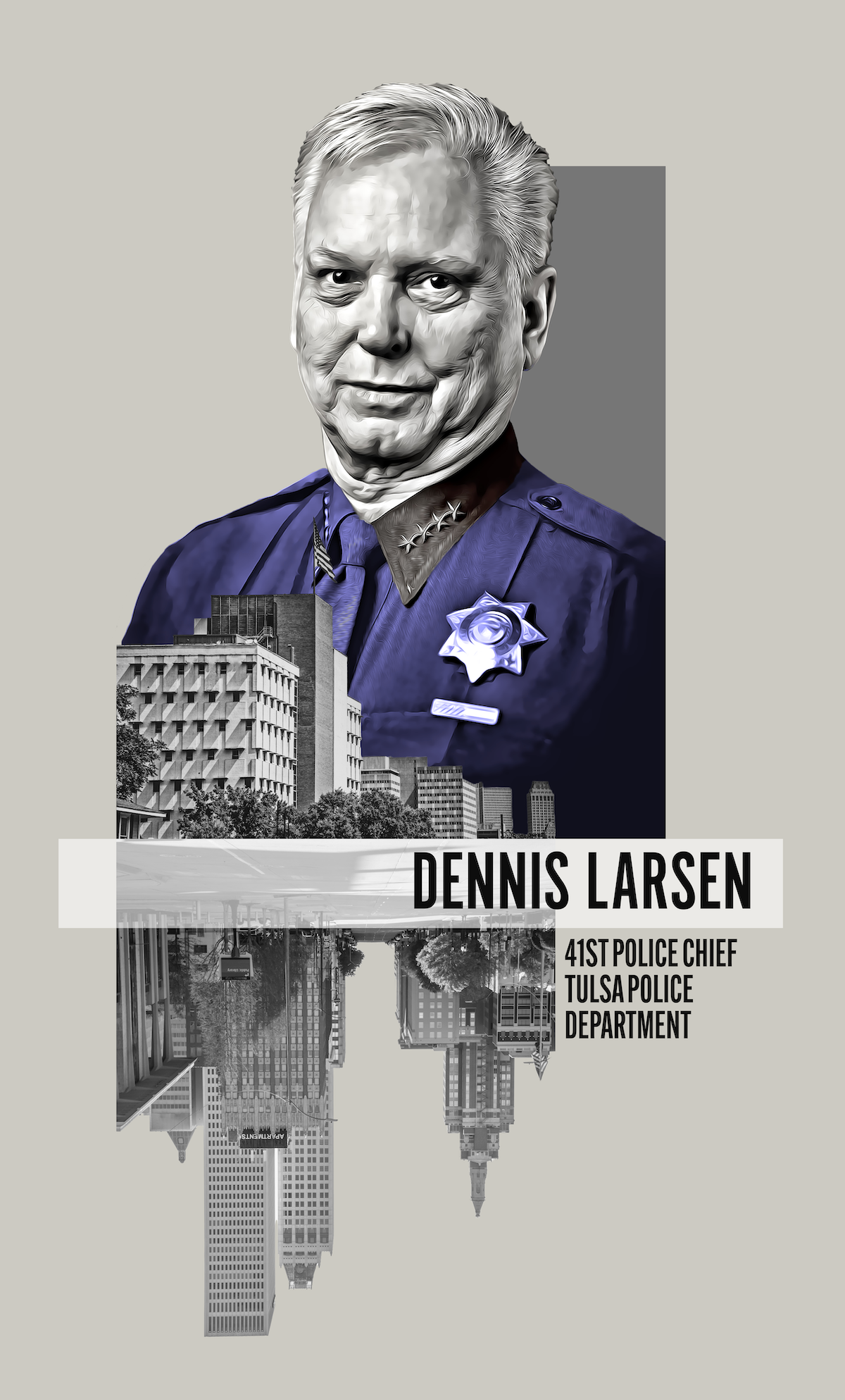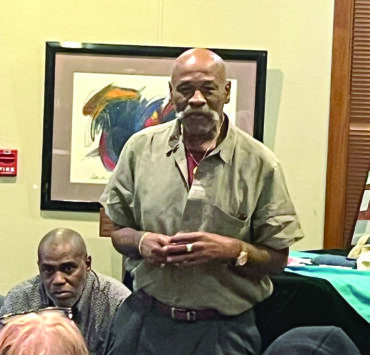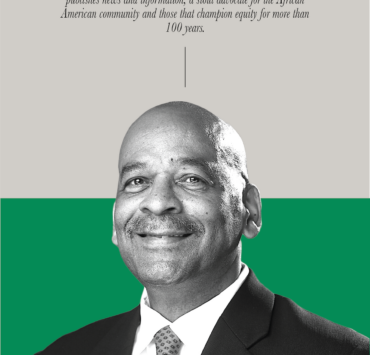
LOCAL & STATE
Kimberly Marsh, The Oklahoma Eagle
Illustration, The Oklahoma Eagle
Deputy Chief Dennis Larsen, a 45-year veteran of the Tulsa Police Department, was gracious, sincere, and genuine as he launched an open conversation with The Oklahoma Eagle about his succession to Tulsa’s Chief of Police on Aug. 1. He was equipped with a pile of documents ready to respond to questions. Larsen replaces Chief Wendell Franklin, who retired from the department to lead private security operations for the Bank of Oklahoma.
During the interview and the news conference announcing Larsen’s promotion, he spoke only sparsely about himself. “I have a passion for this department. I had a passion 45 years ago when I came on, and I still get up every morning, and I smile when I look in the mirror and see the badge on my chest,” he said at the announcement. “There is nothing more important than the men and women in service who go out and protect our city.”
The only personal story he ventured was not even about him. It was a recall of Franklin’s unexpected retirement announcement when he scheduled an impromptu meeting to inform the staff.
“I saw Chief Franklin walking by the door. I said, ‘I don’t do impromptu meetings. What’s the agenda?’ He just smiled and walked on,” Larsen recalled. “Little did I know. Nobody was more shocked in that room when he announced his retirement because I can’t tell you what a great last four years it’s been. We have weathered derechos. We have weathered (situations when) Chief Franklin and I had the only lights on the third floor (Police Department administration building) during the pandemic because we tried to disperse our command staff so nobody would get sick at the same time. Chief Franklin has taught me a lot in the last four years. He is an amazing leader and I think BOK Financial is the smartest to hire him.”
He quickly circled back to the business at hand. “The core reason I am standing here before you is my intent to have the safest city possible,” Larsen said. “And I intend within the department to protect every Tulsa police officer, make sure they have the best equipment and the best experience. So please take that to heart,” he added before offering to answer media questions following the news conference.
Larsen faces significant challenges ahead: police officer shortages, officer morale, community policing critics, homelessness, and the rising use of fentanyl. The deadly drug is entering Tulsa in a new form that is resistant to the life-saving remedy Narcan, which is administered for overdoses.
He outlined his priorities:
- Reduce violent crime. His emphasis is on breaking the cycle of violence with youth offenders. This also involves more extensive involvement in communities.
- More transparency. This will come from the complete development and successful implementation of the online Records and Case Management System (RCMS).
- Recruitment. Increased staffing will assist in not only service to the general public but will reduce stress on existing officers and is a step toward improving morale.
- Better response times. Larsen will continue to develop the Real Time Information Center to provide better public safety response times to calls for service
- Community involvement and feedback. Expand the Citizens Advisory Board (CAB) and Tulsa Police Community Engagement with more CORE Team members.
Larsen also plans to expand the citizens’ advisory boards that work with each of the three police divisions to recruit more women, as well as African American and Latin cadets. He seeks to strengthen the recruitment efforts within Historically Black Colleges and Universities (HBCUs) and universities with sizeable Hispanic enrollment. Under his watch, Larsen will see the completion of the Real Time Information Center and new records management system as he continues to pursue the adoption of improved technology for monitoring, measuring, and reporting on police work.
Larsen’s attention to budget details as a negotiator on the collective bargaining team will be a natural fit for addressing budgeting issues. He prioritizes gathering community feedback through the Zen City performance survey that Franklin put into place during his tenure and to enhance community outreach efforts with a plan that includes more non-sworn staff.
Larsen’s experiences on the force have made him a powerful force. He has led the investigations division and the special operations team. As one of the first officers to respond to the 1995 Alfred P. Murrah bombing in Oklahoma City, he has extensive experience with bomb intervention tactics. Larsen is FBI-trained. He was promoted to deputy chief in 2007, just four months after former Mayor Kathy Taylor invited Ron Palmer back to the City of Tulsa to lead the department as one of her at-will appointments. Larsen was among the seven deputy chiefs who applied for the chief’s position when Mayor Dewey Bartlett’s outside selection for interim chief, Chuck Jordan, was officially hired to the civil service position in 2011. Larsen again was a candidate when Mayor G.T. Bynum’s administration confirmed Major Franklin as chief in 2020. Franklin has praised Larsen for standing by his side, saying that Larsen immediately came to him to offer support.
Franklin quoting Larsen, “He said, ‘I’ve been through a lot of chiefs. I’ve never let anyone fail. I’m not gonna let you fail. So, from that point forward, it was 100% (of Larsen’s support of Franklin). Dennis was also the first deputy chief that I notified on the morning of the notification of (the death of Sgt.) Craig Johnson, in a rush, being in shock when I made that phone call to him. He acted as though he was awake at three o’clock in the morning, and he asked, ‘what do I need to do?”
A suspect fatally shot Sgt. Johnson during a traffic stop on June 29, 2020. The incident rocked the police force and was one of dozens of unique challenges that became a constant during Franklins’ tenure. His term began just three months before the world pandemic shut down and one year before the centennial anniversary of the Tulsa Race Massacre, nationwide protests against excessive use of force on unarmed Black citizens, and a call to defund police departments.
Who is Dennis Larsen?
Larsen, 68, has remained committed and loyal to the force throughout those transitions past the point of retirement eligibility. During the announcement, Bynum became emotional in front of an audience that included three past chiefs, the department’s top brass, the members of Larsen’s family, and the Tulsa news media.
“Four years ago, we were standing right here, and Dennis Larson had been a finalist for this job. But he saw a major in the department promoted over him,” Bynum said at the press conference. “After 40 years of service to the citizens of Tulsa, none of us could have understood if he was angry, bitter, or spiteful in response.
“Instead, Dennis Larson was one of the very first people who called Wendell Franklin to congratulate him. And as Chief Franklin told me, Dennis Larson is the first to step up and take on anything that Chief Franklin has needed to do his job successfully over the last four years. And that’s because Dennis Larson is a true public servant who’s been putting the citizens of Tulsa and the Tulsa police department ahead of himself his entire career.”
Bynum recounted the eight years he worked alongside Larsen, calling him a strong leader who was unflappable in a crisis and who held a love for the department, which has been demonstrated time and time again.
“I want to be clear that despite his remarkable career, I’m not appointing Dennis Larsen as our next chief of police because of what he’s done to date. I’m appointing him chief of police because of what I’m confident he will do for the citizens of Tulsa and the Tulsa Police Department moving forward.”
Bynum said Larsen is poised to become “the person who has a track record of using technology to improve outcomes,” to realize the full potential of the department’s Real Time Information Center, to implement a new records management system, and strengthen partnerships with federal and tribal law enforcement. He credited Larsen with steady improvement in Tulsa’s homicide solve rate to 90 percent for recruiting “brilliant” officers into the homicide unit and securing the technology needed to do their jobs “at the highest level.”
Larsen grew up in north Tulsa with his mother, father, and two sisters. They lived near Woodrow and Harvard from 1955 to 1969. He attended Jackson Elementary, now known as Unity Learning Academy, and Cleveland Jr. High School. The family moved to a home near Admiral and Garnett, where he graduated from East Central High School in 1973. He earned his degree from Oklahoma State University and entered the Tulsa Police Academy. Bynum noted that in 1995, Larsen was among the first to rush to the Alfred P. Murrah Federal Building in Oklahoma City as a member of the bomb squad, where he spent 101 days in service.
A Pathway to a Degree and a Badge
Officer shortages, the nature of the job, and criticism of law enforcement across the nation have led to morale problems, which can partially be addressed by increasing the number of officers closer to the authorized count of 943, Larsen said. The number of active officers on duty changes daily with leave and retirements, and so on.
But on the day Larsen spoke with The Oklahoma Eagle, that number was 810. The department is approved for two 30-person academies in the current budget cycle. In the past couple of years, the number of actual recruits has been as low as nine in one class and as high as 28.
There is an emphasis on education so recruits can understand and apply constitutional law. Tulsa police candidates are required to have a bachelor’s degree to be considered. Larsen said the department opened a new recruitment program called Pathway to a Degree last year.
Six universities have agreed to use the TPD academy as the last credit hours a student needs to finish college. This allows candidates fresh out of high school to earn their associate degree from Tulsa Community College and transfer to a four-year university to complete coursework over three semesters and fulfill their final degree requirements while working as a paid cadet.
Northeastern State University was the first state institution to sign up for the program, followed by Oklahoma State University. The program also calls for more communication with local high school counselors to ensure that students are aware of the program, and it includes relationships with Booker T. Washington, McLain, Central, and East Central high schools. They also work with colleges and universities around the country to find more African American and Latin recruits, including Historically Black Colleges and Universities (HBCUs, such as Langston University) and those who serve many Hispanic students, including several in New Mexico.
Larsen said they have a priority goal for women to make up 30 percent of the officer recruits by 2030, as women make up 50 percent of the U. S. population. The Tulsa female officer rate is now 17 percent, above the 12 percent national average.
Community Policing
In May 2022, a comprehensive report by CNA, a non-profit research and analysis firm that the department commissioned to examine and provide feedback on how the TPD is doing, reported that the Tulsa Police Department had fallen far short of achieving its “community policing” goals and reflected widespread criticism in north Tulsa of the TPD’s commitment to improving its relations with the community.
Community policing is a proactive effort to identify and solve problems through collaborative efforts with the community, particularly in high-crime and marginalized city areas. (See the May 23 issue, www.theokeagle.com)
While this first conversation with the chief did not delve into the 120 items on the report, Larsen offered his opinion and philosophy on Tulsa’s level of community policing.
“It’s basically getting out in the area of town you’re assigned to work with and coming into contact with the citizens who work and play and live in that area,” he said.
Larsen said community policing comes into play not just with reducing crime but with increasing trust and having collaborations that support businesses to fuel the city’s success, “which makes policing a whole lot easier.”
Larsen also said he wants to increase community policing efforts and foot patrols, engage more with neighborhoods and the business community, and continue to hire civilian “community outreach ambassadors” to help with community engagement. In this time of rapidly changing laws concerning immigration, Larsen said he will be seen in the Hispanic community and that it is in the city’s best interest to support Hispanic businesses and startups.
Larsen said he wants to expand the Citizens Advisory Board that Chief Franklin established to increase the number of people working with each police division and increase direct feedback from citizens on the changes the department makes or proposes. The department is expanding its involvement in high schools to identify and intervene in high-risk use and provide alternative pathways for at-risk youth. Officers also work with apartment complexes, and they have created an “impact group” focused on downtown entertainment districts.








